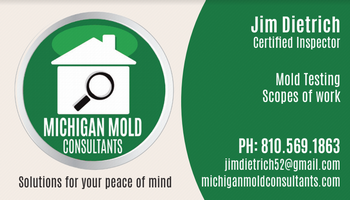Got mold? Give Jim a call at (810) 569-1863!
Advice and Resources
Following is a list of resources and advice which may help you to cope when your area has been flooded. Many of these links go out to reputable external sites such as HUD andf the CDC. If you ahve any questions or need assistance with your home, please contact me directly to set up a consultation.
Flood Safety - American Red Cross
Cleaning Up After a Flood (CDC)
National Flood Insurance information from EGLE Michigan Dept. of Environment, Great Lakes and Energy
FEMA's official site for the National Flood Insurance Program
FEMA's brochure on dealing with Mold & MIldew in your home (PDF)
Central MIchigan District Halth Department - Flood Preparedness
EPA Resources for Flood Cleanup
Flood Cleanup Webinars by Dr. Gene Cole https://youtu.be/jhxLAQyr980
 Don’t drive in flooded areas — turn around, don’t drown! Flood Water / Standing Water (CDC)
Don’t drive in flooded areas — turn around, don’t drown! Flood Water / Standing Water (CDC)
Floodwater can pose a drowning risk for everyone— regardless of their ability to swim. Swiftly moving shallow water can be deadly, and even shallow standing water can be dangerous for small children.
Always follow warnings about flooded roads.
Don’t drive in flooded areas—cars or other vehicles won’t protect you from floodwaters. They can be swept away or may stall in moving water.
Stay out of floodwater.
Floodwaters contain many things that may harm health. We don’t know exactly what is in floodwater at any given point in time. Floodwater can contain:
- Downed power lines
- Human and livestock waste
- Household, medical, and industrial hazardous waste (chemical, biological, and radiological)
- Coal ash waste that can contain carcinogenic compounds such as arsenic, chromium, and mercury
- Other contaminants that can lead to illness
- Physical objects such as lumber, vehicles, and debris
- Wild or stray animals such as rodents and snakes
Exposure to contaminated floodwater can cause:
- Wound infections
- Skin rash
- Gastrointestinal illness
- Tetanus
- Leptospirosis (not common)
- It is important to protect yourself from exposure to floodwater regardless of the source of contamination. The best way to protect yourself is to stay out of the water.
If you come in contact with floodwater:
- Wash the area with soap and clean water as soon as possible. If you don’t have soap or water, use alcohol-based wipes or sanitizer.
- Take care of wounds and seek medical attention if necessary.
- Wash clothes contaminated with flood or sewage water in hot water and detergent before reusing them.
- If you must enter floodwater, wear rubber boots, rubber gloves, and goggles.
Here's what my clients say about me:
Jim Dietrich performed mold testing on my parent's home, which I coordinated while they were out of town. He was on-time and professional. He gave us a detailed report on the testing outcome and scope of work needed to remedy the mold problem. He was responsive to questions we had and provided alternative solutions to the scope of work. He proactively kept us informed of the status of the lab testing, when the lab was late delivering results. Thank you Jim! Roger Grand Blanc, Michigan
Michigan Mold Consultants
Jim Dietrich
Flushing, MI 48433
(810) 569-1863

Michigan Mold Consultants
Jim Dietrich
Flushing, MI 48433
(810) 569-1863
Areas Served
: AREAS SERVED: Flint, Flushing, Swartz Creek, Grand Blanc, Davison, Lapeer, Port Huron, Mt. Morris, Fenton, Saginaw/Bay City/Midland. :
